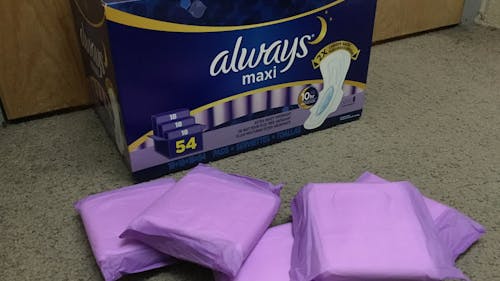RUSA considers providing free pads and tampons in University bathrooms

The Rutgers University Student Assembly (RUSA) is considering providing free tampons and pads in bathrooms after Brown University released a statement guaranteeing free feminine hygiene products to students.
Brown University announced on Sept. 6 that its Undergraduate Council of Students (UCS) “will be providing tampons and sanitary napkins in non-residential women’s, men’s and gender-inclusive bathrooms across campus,” reads a press release to its Facebook page.
“This initiative is a student-run effort. UCS will be restocking and maintaining these items on a weekly basis,” the release says.
RUSA Public Relations Chair Vladimir Carrasco said RUSA is aware of the news and has reached out to University Facilities and Capital Planning to learn more about the current dispensaries of feminine products on campus.
RUSA has “reached out to schools in the Big Ten conference to research their university policies” on such an initiative, the School of Arts and Sciences sophomore said.
While RUSA has not officially discussed the implementation of free feminine hygiene products across campuses, Carrasco said several members are “focused on making these resources more accessible.”
Meenal Paul agreed, lamenting the current state of availability of pads and tampons.
“Getting free pads and tampons is secondary," the School of Arts and Sciences junior said. "They’re not even available for money. The bathroom vending machines are always empty.”
Jessica Tuazon, a School of Engineering sophomore, said she has never used one of the University’s feminine product dispensers.
“I don't usually come to the bathroom with my wallet, let alone a few quarters. I come to the bathroom with a tampon I bought in a large box from the store,” she said. “It's a better fit for what my body goes through once a month and a more economical choice.”
Tuazon said it was more important to find ways to get pads and tampons to students who cannot purchase their own.
Aasha Shaik, a Rutgers Business School first-year student student, likens free feminine hygiene products to other university bathroom products.
“In bathrooms, universities provide free toilet paper. They provide free hand soap. They provide free paper towels or hand dryers. Many schools even provide free condoms,” Shaik said. “If all of those items vital to hygiene and safety are being provided for free, why wouldn't items as necessary as pads and tampons be provided in case of emergency as well?”
Indeed, necessity was one of the driving forces behind Brown University’s initiative.
“Why aren’t these products treated the same way as other products we hand out, like toilet paper?” said Viet Nguyen, president of Brown’s Undergraduate Council of Students. “It’s a necessity, rather than a luxury, so Brown and other universities should treat them as such.”
Similar controversies have been occurring across the country regarding the current luxury tax on pads and tampons.
While Nguyen said UCS has received “a dozen enthusiastic calls and emails from other universities,” he anticipated backlash against feminine products in men’s bathrooms.
"(The UCS) wanted to make the products available in all bathrooms on campus, regardless of their gender labels, to be inclusive to transgender students,” Nguyen said.
Emily Hung, a Rutgers Business School first-year student, said the inclusion of feminine products in men’s bathrooms would “help with the normality of trans students. Men can have periods too.”
Hung said “Rutgers is already doing a great job being inclusive,” noting that she saw urinals in a women’s bathroom, which was a dramatic difference from her experience in high school.
“(That type of inclusion) made me happy, even though I am a cis woman,” she said. “I’d like to imagine that just the appearance of urinals in women’s bathrooms would help normalize the existence of trans people and would help with any potential dysphoria felt by trans people.”
Tampons and pads in men’s bathrooms would have a similar effect, Hung said, adding: “This would also help normalize the idea of menstruation for men. After all, it is just a normal bodily function and it is just as important for men to be knowledgeable about it as women."
“I don't think a very public effort towards getting free pads and tampons can be made until we end the taboo around a woman's period," Tuazon said.
Bushra Hasan is a School of Arts and Sciences sophomore majoring in cell biology and neuroscience. She is a staff writer for The Daily Targum. Follow her on Twitter @bushrafhasan for more.



